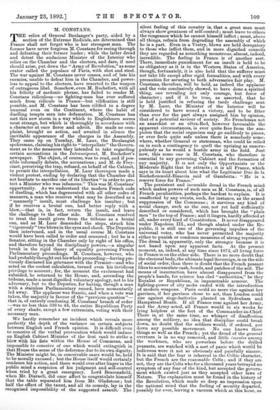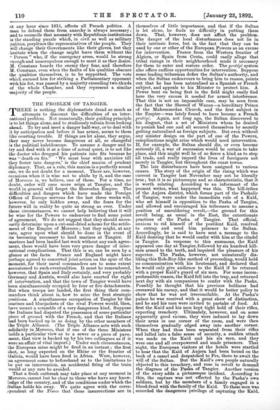M. CONSTANS.
119relics of General Boulanger's party, aided by a ection of the Extreme Radicals, are determined that France shall not forget who is her strongest man. The former have never forgiven M. Constans for seeing through and defeating their former leader ; while the latter dread and detest the audacious Minister of the Interior who relies on the Chamber and the electors, and dare, if need should arise, put down the " Army of Revolution," as some orator called the populace of Paris, with shot and steel. The war against M. Constans never ceases, and of late his enemies, unable to defeat him in the Chamber, and power- less to appeal to the electors, have resorted to the weapon of outrageous libel. Somehow, even M. Rochefort, with all his felicity of sardonic phrase, has failed to render M. Constans ridiculous—no fighting-man has ever suffered much from ridicule in France—but vilification is still possible, and M. Constans has been vilified to a degree unusual even on the Continent, where the habit of duelling tempts men into defamation. M. Constans has met this new storm in a way which to Englishmen seems most strange, but which is thoroughly in accordance with a character at once fierce and adroit. He made no com- plaint, brought no action, and awaited in silence the inevitable appearance of the charges in the Assembly. They came up on Tuesday, M. Laur, the Boulangist spokesman, claiming his right to " interpellate" the Govern- ment as to the measures they intended to take regarding certain accusations in the Intransigeant, M. Rochefort's newspaper. The object, of course, was to read, and if pos- sible informally debate, the accusations ; and M. de Frey- cinet, perceiving the trap, refused, on behalf of the Cabinet, to permit the interpellation. M. Laur thereupon made a violent protest, ending by declaring that the Chamber did not hesitate to sacrifice one of its liberties " in order to pro- tect a Minister who was infamous." This was M. Constans' opportunity. As we understand the modern French code of duelling, which has degenerated with all other codes of manners, a man who receives what may be described as a " mannerly " insult, must challenge his insulter ; but if he receives a brutal one, had better reply with a blow,—that is, in fact, return the insult, and leave the challenge to the other side. M. Constans resolved to treat the insult given from the tribune as a brutal one, and as M. Laur descended the steps, struck him " vigorously " two blows in the eyes and cheek. The Deputies then intervened, and in the usual course M. Constans would have been called to order and censured ; but he is a Senator, sitting in the Chamber only by right of his office, and therefore beyond its disciplinary powers,—a singular break in the rigid theory of equality governing French Parliamentary proceedings. M. Constans, however, who had probably thought out his whole proceeding—having pre- viously discussed his grievance with the Premier—and who acted on the coolest calculation, turned even his invidious privilege to account; for, the moment the excitement had subsided, he returned to the House, and, ascending the tribune, made a most dignified voluntary apology, not to his adversary, but to the Deputies, for having, though a man with a stainless Parliamentary record, been momentarily led away. The applause was frantic, and when a vote was taken, the majority in favour of the "previous question"— that is, of entirely condoning M. Constans' breach of order —was no less than 338 to 44, the entire Republican Party of every shade, except a few extremists, voting with their necessary man.
We hardly remember an incident which reveals more perfectly the depth of the variance on certain subjects between English and French opinion. It is difficult even to conceive of the verbal provocation which would induce an English Cabinet Minister of the first rank to strike a blow with his fists within the House of Commons, and impossible to conceive of one which would extinguish in that House the sense of the deference due to its own dignity. The Minister might be, in conceivable cases would be, held to be morally excused ; but the House itself would certainly condemn his action, and there would ever after linger in the public mind a suspicion of his judgment and self-control when tried by a great emergency. Lord Beaconsfield, when Mr. Disraeli, did once affect to congratulate himself that the table separated him from Mr. Gladstone ; but half the effect of the taunt, and all its comedy, lay in the recognised impossibility of the suggested assault. The silent feeling of this country is, that a great man must always show greatness of self-control ; must leave to others the vengeance which he cannot himself inflict ; must, above all things, refrain from degrading the assembly of which he is a part. Even in a Vestry, blows are held derogatory to those who inflict them, and in more dignified councils they are regarded as something monstrous, almost, indeed, incredible. The feeling in France is of another sort.
There, immediate punishment for an insult is held to be as obligatory as it is in the Western States of America, though, fortunately, it is also held that the sufferer must not take life except after rigid formalities, and with every precaution for securing to both adversaries fair play. M. Constans, therefore, will be held, as indeed the applause and the vote conclusively showed, to have done a spirited thing, one revealing not only courage, but force of character ; and if it be true, as asserted, that he is held justified in refusing the tardy challenge sent by M. Laur, the Minister of the Interior will be considered to have scored a victory, and to be fitter than ever for the part always assigned him by opinion, that of a potential saviour of society. No Frenchman not an anarchist or an ultra-Red, however favourable the apparent circumstances, is ever quite free from the sus- picion that the-social organism may go suddenly to pieces, or ever feels quite safe unless there is somebody some- where, whether General or statesman, who could be relied on in such a contingency to quell the uprising as unscru- pulously as he would a hostile army in the field. Just now, this some one is M. Constans, who therefore is essential to any governing Cabinet and the formation of any majority. It is not only the Opportunists or the Moderate Right that he attracts ; it is all France, which says in its heart about him what the Legitimist Due de la Rochefoucauld-Bisaccia said of Gambetta : " He is a reserve force for France."
The persistent and incurable dread in the French mind which makes powers of such men as M. Constans, is, of all French peculiarities, perhaps the hardest to explain. It is unaffected by any events, such, for instance, as the armed suppression of the Commune ; it survives any kind of social change, such as the one, not yet half sufficiently described or considered, which has brought the " plain men " to the top of France ; and it lingers, hardly affected at all, under every kind of Constitution. It never disappeared under Napoleon III., and though abated under the Re- public, it is still one of the governing impulses of the universal voter, who has never permitted the majority either to punish or condemn measures of strong repression. The dread is, apparently, only the stronger because it is not based upon any apparent facts. At the present moment, as, indeed, at any time since 1872, all living force in France is on the other side. There is no more doubt that the electoral body, the ultimate legal Sovereign, is on the side of social order, than there is doubt that the French peasant likes to accumulate cash, bonds, and patches of the soil. The means of insurrection have almost disappeared from the people's hands, for science has clad "authorities," be they Royalist or Republican, in impenetrable armour. The fighting-power of city mobs ended with the introduction of modern weapons. Paris could no more rise against her garrison, if her garrison chose to act, than London could rise against siege-batteries planted on Sydenham and Hampstead Heath. If all France rose against her Army, and the Army acted, all France would in six weeks be lying helpless at the feet of the Commander-in-Chief. There is, at the same time, no whisper of disaffection among the soldiery, no idea that discipline could break down, no doubt that the soldiers would, if ordered, put down any possible movement. No one knows these things so well as the French ; yet the dread of the general overturn is in no way removed, and little gmeutes among the workmen, who are powerless before the drilled peasants, are watched with a sort of panic which would be ludicrous were it not so obviously and painfully sincere. It is said that the fear is inherent in the Celtic character, but the French are the reasonable Celts ; and if they are not, they are the Celts who for a thousand years betrayed no symptom of any fear of the kind, but accepted the govern- ment which existed just as they accepted other laws of Nature. The explanation must be found in the history of the Revolution, which made so deep an impression upon the national mind that the feeling of security departed, possibly for ever, leaving a vacuum which at this hour, as at any hour since 1815, affects all French politics. A man to defend them from anarchy is always necessary ; and to reconcile that necessity with Republican institutions is the standing puzzle which, in civil as well as military politics, perplexes the representatives of the people. They will change their Governments like their gloves, but they hesitate when the change might leave them without the Person " who, if the emergency arose, would be strong enough and unscrupulous enough to meet it as they desire. M. Constans beards the enemy they fear, and therefore M. Constans, even when the faults of his qualities obscure the qualities themselves, is to be supported. The vote which excused him for striking a Parliamentary opponent with his fist, was passed by a majority exceeding two-thirds of the whole Chamber, and they represent a similar majority of the people.



































 Previous page
Previous page